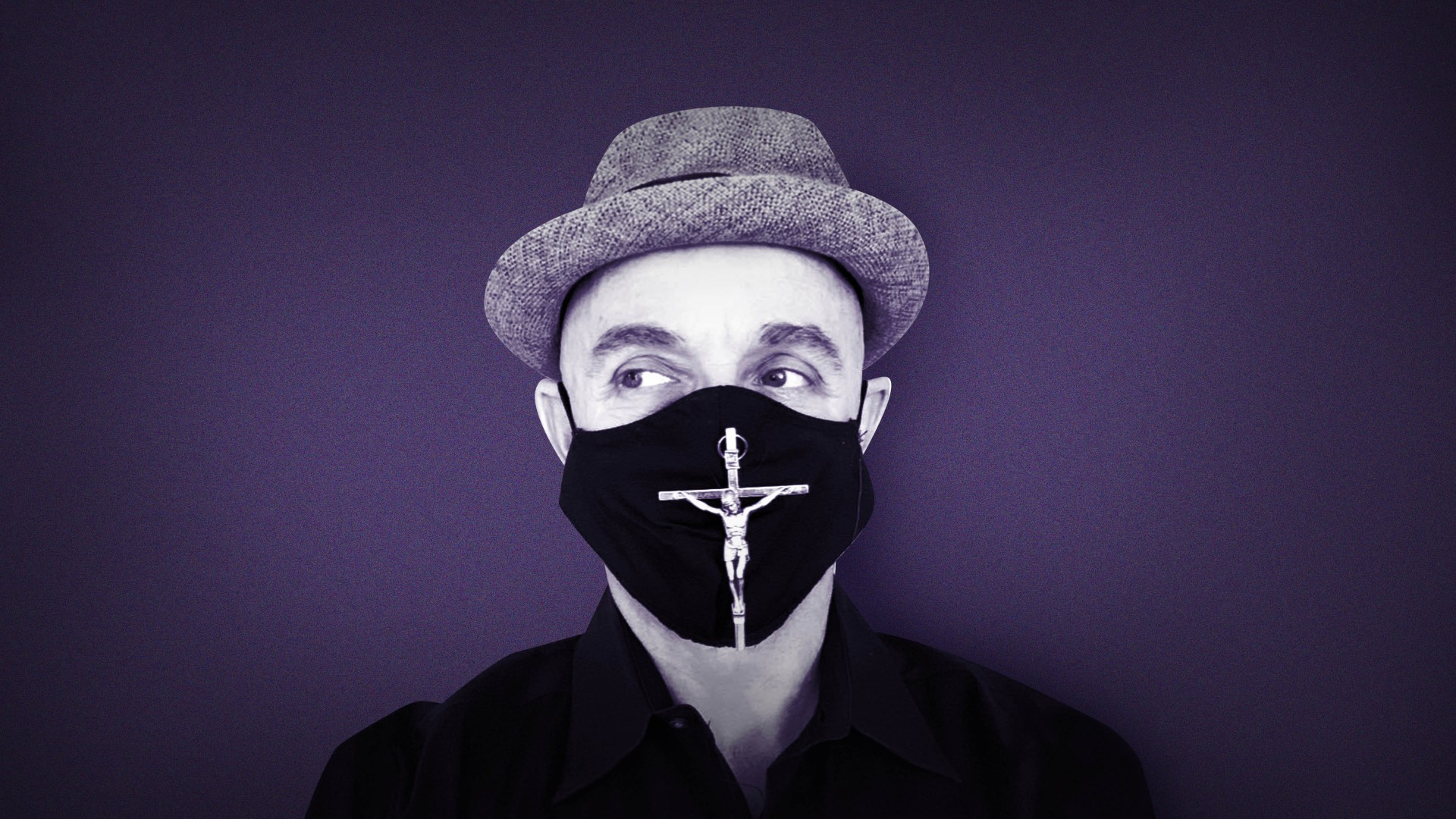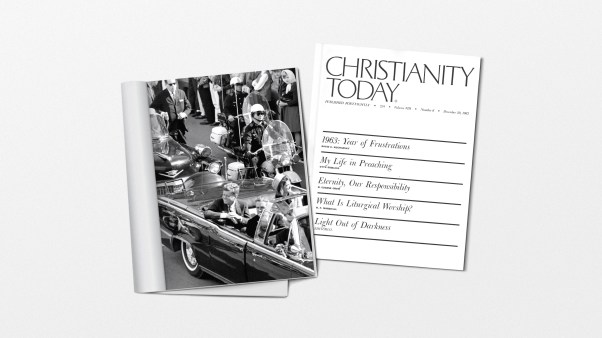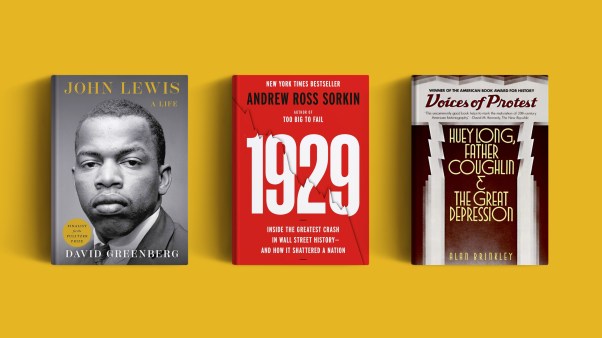At first glance, the worlds of fashion and theology might appear to have little to do with one another. A shallow survey of each might even frame them as opposites, equating fashion with frivolity and ephemerality while painting theology as concerned with matters more eternal and profound. But the truth is that there are more Christians quietly shaping the fashion industry than one might suppose. And major Christian thinkers, from Augustine of Hippo to John Calvin, have had plenty to say about sartorial matters.
In his new book Fashion Theology, cultural theologian Robert Covolo explores the complex relationship between fashion and theology throughout history, highlighting the richness these disciplines stand to forfeit when they ignore each other. Journalist Whitney Bauck, who reports on the intersection of fashion and faith, spoke with Covolo about the theological depths opened up in the simple act of getting dressed each morning.
Why write a book on fashion and theology?
So many books have been written about the relationship between theology and film or literature or psychology or food. But dress is just as essential to our everyday existence. I realized there was nothing theological out there taking fashion studies seriously beyond a chapter here or there. Fashion studies is an expansive field of theoretical discourse that has spread to universities across the globe. And there has been little to no Christian engagement with it.
The other side of what interested me is that theology itself is a cultural pursuit. We’re always going to be producing theology because culture always has new questions about the relevance of the Christian faith. If we don’t understand theologians within their cultural context, we’re missing an awful lot about who they are.
Augustine, for instance, was a North African in the late Roman republic, dealing with those material and cultural realities. John Calvin was a French Protestant refugee who had to flee for his life during a time of great upheaval. How did his theological mind think about dress? When you look at the details, you actually get to see what this theology looks like on the street. All theology comes from the experiences of the theologians themselves. When you find out so many interesting details about these theologians, it really opens your eyes to how human they were.
If fashion and theology are this interconnected, why are they so often treated as totally separate realms?
They have often been considered divorced from one another because of superficial characterizations of both: that fashion is about appearances, vanity, fad, and thoughtlessness; and that theology, by contrast, is about profundity, solemnity, and what’s eternal. The reality is that once you start drilling into them, neither of those areas of inquiry fits the stereotypes. There has been tension between the two, and I’m not going to sweep that under the rug; some theology is more friendly towards fashion than other theology. But there are just as many resonances as there are dissonances. And we don’t really help the discussion when we don’t recognize that.
Your book spends a good bit of time tracing the history of Western thought with regard to fashion theory and theology. Since so much of that recorded history emerged from the minds of men, I’m curious whether you have any comments about the ways that gender informs the historical relationship between theology and fashion.
Fashion challenges and questions all conventions of social identity, but gender was one of the first, and it’s been the predominant one. It’s a massive subject I intentionally sidestepped. I drew from classic Western theologians in order to give a genealogy. So it’s one vantage point; it is not the be all and end all. The greatest compliment to the book will be when someone writes another book to say it was all wrong. I do hope that someone follows up to emphasize the role of gender—that deserves an entire book in its own right.
You’ve spent so many years of your life thinking about and studying fashion, but the book retains a lot of ambivalence toward it. Why is that?
I don’t feel personally ambivalent about fashion—I feel quite optimistic. Calvin sees fashion as a good gift; Abraham Kuyper and G. K. Chesterton celebrate the conviviality it fosters. I love fashion. But maybe what comes across in the book is that I don’t want to give a simple story of fashion and theology being easy friends that just naturally merge together and imply that any fool should see this. Nor do I want to pit them against each other as enemies. What I want to show is that they have a complex relationship. I want to allow there to be tensions where there are tensions.
If you look at the biblical witness, being dressed, generally speaking, is a great boon within the Bible. As the prophet Isaiah says, “he has clothed me with garments of salvation and arrayed me in a robe of righteousness” (61:10). The Proverbs 31 woman is marked out for being able to make her family stunning (v. 21). Paul assures believers they will not be found naked on the day of resurrection (2 Cor. 5:3). It’s God who is dressing people.
Fashion itself is such a complex phenomenon that we need to address all its expressions in the complexity they deserve: fashion as an art form, as a site for meaning making, how it shapes our political life, our social identity, our economic system, and our public discourse. Fashion may fall a little out of focus right now because so much of our focus is on identity markers like gender, class, and race. But fashion can never be reduced to those things because it constantly references individual taste.
That focus on the individual harkens back to the Augustinian impulse. Augustine deals with the inner self: He’s plunging the depths, and he’s saying there’s a mystery to the person. Fashion emerges from the Augustinian heritage, and it can also be used to return us to the Augustinian heritage, because it says that the personal narratives that make up our lives are the things that are most true about who we are.
What have you learned while working on this book that has most surprised you?
You can’t see the world the same way once you have taken fashion seriously. There’s this robust theology of dress in the Bible. I hope this book helps Christians see that we no longer have the luxury of simply ignoring what fashion is, what it comes from, and how it permeates our lives. Because fashion is deeply intertwined with the modern world, all of us live within the fashion system. We even get the word modern from the Latin modo, which means “presently” or “just now.” So the modern world is permeated with this fascination with the now, the new.
This is not antithetical to the Christian faith. Living in the present tense is part of Paul’s very posture—in Philippians, he spoke of “forgetting what is behind and straining toward what is ahead” (3:13). Anyone who knows Christ is a new creature. And Christians used to see a great resonance between fashion’s celebration of the new and the Christian faith. In fact, on Easter Sunday throughout America in the last century, Christians would come out of church and parade around in their new fashion as a statement that they were people of the Resurrection who believed that God was going to bring them new, glorified bodies.
Theologians aren’t ambivalent about fashion. Over and over again in my study, I cite them saying that fashion points to our ultimate hopes. The reason we’re so fascinated with fashion is because there is an implicit statement of faith you can’t help making, whether you are a believer or an unbeliever: You have hope for your body, you have hope for the new, and you are fascinated with the idea that one day you could be gloriously beautiful.
Fashion plays with that hope. It plays with this idea that we can somehow reframe ourselves in a way that opens up our lives and our stories, our social and political realities. So people are touching on very deep theological themes when they get dressed, without even knowing it. They are referencing the meanings of their lives, and they’re attempting to understand where they’re going and where they’ve been. Christianity tells us a story of where we’ve been, where we’re going, and where hope for the future is found.
What do you think would change for the church if it took fashion seriously?
Once you start thinking about clothing and how it operates, sections of the Bible come alive in a way you’ve probably never noticed. Look at the whole narrative arc of Joseph! But I think it would also help us to be more empathetic or more understanding about our differences. And then we could celebrate what the church is meant to be: a place where people who have a variety of different interests and loves come together around their common faith in Christ.
Also, when we show the relationship between everyday practices and our theological beliefs, Christianity becomes a coherent worldview and not just a private language that we speak when we go to church. I’m hoping that this book will help Christians integrate their lives. It’s not a good thing that we can no longer see how the everyday practices of our lives connect to the richness and depth of our faith. We desperately need the kind of integrated theology that moves beyond ivory-tower academic discussions to show how something very tangible that everybody interacts with actually touches on some of the most significant questions in the Bible.
This book has a lot to say to Christians, but it also has a lot to say to the burgeoning field of fashion theory. How do you think fashion theory would change if its practitioners took theology more seriously?
For fashion theorists, I am destroying the assumption that this is a purely secular discipline. And I’m showing how deeply indebted fashion theory is to Christian theology. I even make the argument that John Calvin helped advance fashion. That’s worth the price of the book right there!
I argue that Augustine is the first fashion theorist. How many people in fashion studies realize that back in the fifth century, a Christian theologian was talking about how fashion works as a complex form of signification in advanced societies? You can’t really understand the rise of fashion without understanding how deeply fashion studies is indebted to theology. And to the degree that fashion developed in the West, even though it is global in its spread—which many fashion theorists believe—then we have to ask serious questions about how the religion of the Incarnation uniquely helped propel it along.
That’s not to say that Christianity is entirely responsible for the rise of fashion, of course. But there is a relationship worth exploring. And it’s not a simple story of theologians hating style and getting in the way of us being expressive. It’s far more interesting than that.
Has anything changed about how you dress in the course of working on the book?
I have come to really enjoy dressing because I can hear the voices of different theologians in the back of my head recognizing what I’m doing and celebrating it. As someone who takes seriously the witness of the church, not just within the 20th century but throughout its history, it gives me so much joy to know how Aquinas or Augustine might view what I’m doing.
At the end of the day, fashion should be received as a good gift. Of course it’s not totally innocent—there is no cultural arena in this world that is. But the point is, I have developed a real love for working within the aesthetic range of the body and recognizing that other people are too. You can’t read about the history of blue jeans without recognizing that people wearing them are drawing from some kind of collective memory, even if they don’t realize it.
I can’t help but think what Calvin would say, which is that every day we should thank God that God decided to include seeing and being seen as part of the created order. Before the Fall, you have Adam looking upon Eve and saying, “Bone of my bones and flesh of my flesh” (Gen. 2:23). There’s a recognition of both sameness and otherness. That is the register that fashion works on: seeing and being seen. Adam receives that with great joy. And that is a call for Christians to once again restore seeing and being seen as something God allows us to participate in. Dress is fundamental to our humanity, and we can approach it as a great way of loving others, celebrating the gift of life, and thanking our Creator for that way of being in the world.










